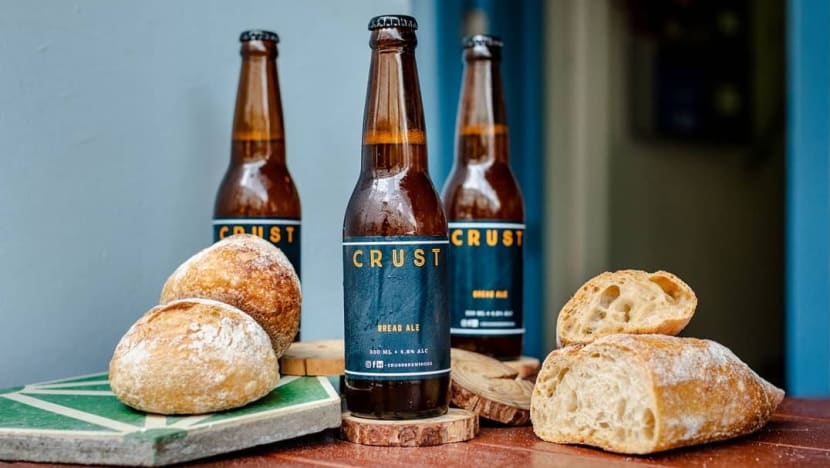The Climate Conversations: The company making beer from unsold bread
By turning unsold bread into beer, one Singapore company tells The Climate Conversations podcast host Julie Yoo how it saved 2,500kg of bread from being tossed into landfills.

SINGAPORE: Standing outside a bakery, it is difficult to imagine loaves of unsold bread being tossed into a bin. But that is the fate of more than 24 million slices of bread around the world that are thrown away each day.
By extracting sugar from bread, homegrown start-up CRUST is tackling food waste by upcycling unsold bread into beer.
CEO Travin Singh says the start-up, which began in 2019, has brewed close to a hundred variations of beer from different types of bread.
“Rye bread goes really well with a darker beer. If you try a sourdough bread, it goes really well with an India Pale Ale (IPA)”, says the 31-year-old.
The company has since expanded its business to include sparkling sodas made from excess fruits and vegetables.
“When we first started, we collected a small amount (of bread) from different bakeries, but we realised it was not economical or environmental. So we started identifying much larger companies and then just have one collection point,” says Singh.
Here are some highlights of this episode of The Climate Conversations:
HOW IS BEER MADE FROM UNSOLD BREAD?
Singh: “What we extract is the sugar content from bread and rice to replace grains. When we collect bread, we make sure it is in the right condition (the bread is in the right size to extract as much sugar as possible and the delivery is done correctly) … Then we go to the brewery and make our beers there.”
For those wondering how upcycled beer tastes, Singh says it is exactly like regular beer.
“If you think that the beer is going to taste different, then you will be disappointed because it tastes more or less like whatever the market already has.’’
BEYOND UPCYCLING, HOW IS CRUST REDUCING ITS CARBON FOOTPRINT?
However, brewing is not the most sustainable process as it uses a lot of water and energy.
Singh acknowledges that the beer making process is resource intensive but says “upcycling is not the only way that we can reduce our carbon footprint”.
He highlights three ways the company is reducing its carbon emissions: Using locally sourced produce, maximising underused production facilities and making new products from spent grain.
For locally grown produce, Singh says CRUST has replaced “a good amount” of imported hops (flowers of the lupulus plant that gives the aroma and flavor in beer) with lemon myrtle, a botanical that is grown at Gardens by The Bay.
“So, it is not just R&D innovation but supply chain as well … And the more botanicals I can find in Singapore ... I don't have to fly hops in huge amounts from overseas.”
When we eventually turn profitable, I will not have a shareholder meeting or board meeting where profit is the only thing that is mentioned while forgetting environmental social concerns.
WHAT MORE HAS TO BE DONE TO TACKLE FOOD WASTE?
There’s great potential in understanding how to put food waste to better use, says Singh.
We don't have farms (in Singapore), so those of us who grew up here don't actually see the amount of resources and manpower that goes into growing something. (So) it becomes second nature for us to just throw something away.
To tackle the massive global problem of food waste, Singh says more companies should rethink their business models and work together.
“A lot of competing business models are at the detriment of environmental and social causes. The future of food should be more collaborative and less competitive. That is where our north star is.”
For the full conversation, listen to this episode on how Singapore start-up CRUST is transforming unsold food into drinks.












